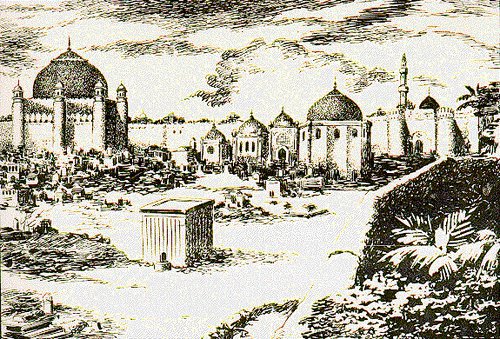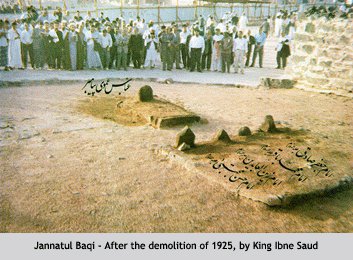On October 7th, a bombing of a Sunni and Sufi saint's shrine in Karachi, Pakistan left 9 Muslims dead and 74 Muslims wounded, according to CNN. The bombing in Karachi occurred when the administrators of the shrine were distributing food to the poor. Thursday night is also considered holy night in Sufi traditions, traditionally reserved as a night of gathering, contemplation and reflection. A perfect time to attack.
Three months ago in Pakistan, the shrine of the famous saint and scholar, Ali al-Hujwiri, author of the Sufi treatise "The Kashf Al Mahjub" (Revelations of the Veiled), was bombed, that attack left 41 Muslims killed and at least 175 Muslims injured.
In 2008, the Combating Terrorism Center at West Point released a report which found that Muslims account for 85 percent of the casualties from al Qaeda attacks between 2004-2008. In the last two years of the study, Muslims accounted for 98 percent of the victims of global terrorism.
Why are these ancient buildings and common Muslims targets of militant actions? Historical facts are necessary in order to bring context to these heinous crimes, and they are surprising.
The destruction of tombs and shrines along with Muslim deaths, have been a repeated pattern for Wahabi militants for over a century: even in the heart of the Islamic world, Makkah and Medina.
In a text published in 1883, "Mirat al-Haramain", historian and rear admiral in the Ottoman Navy, Ayyub Sabree Pasha, wrote:
The tortures done to the Muslims in the blessed city of Mecca and to the pilgrims every year were so heavy that it is very difficult to describe in detail...
He (Sa'ud) appointed 'Abd al-Muin as the head official of the district and ordered that all shrines and graves should be demolished, because, in view of the Wahhabis, the people of Mecca and Medina were not worshiping Allahu ta'ala, but shrines. They said that they would be worshiping Allah in its true form if shrines and graves were demolished. According to Muhammad ibn 'Abd al-Wahhab, all the Muslims had died as disbelievers or polytheists since 500 A.H. (1106); the true Islam was revealed to him, and it was not permissible to bury those who became Wahhabis near the graves of polytheists, by which he referred to the real Muslims.
Domingo Badia y Lebich, a spy for Napoleon who visited Arabia in 1807, described Wahabi treatment of their opposition:
The reform of Abdoulwehhab being admitted by Ibn Saaoud, was embraced by all the tribes subject to his command. This was a pretext for attacking the neighboring tribes, who were successively reduced to the alternative of embracing the reform or of perishing under the sword of the reformer. (ref: Gold, "Hatred's Kingdom").
By declaring mainstream, traditional Muslims as heretics and relegating their practices as foreign to Islam, the Saudi family was able to justify death of civilians as well as desecration of tombs of holy figures.

(Artist Depiction of Jannat al Baqi - Graveyard of Prophet Muhammad's (SWS) Relatives and Companions, Before Wahabi Destruction)
Today's narrative about so-called 'Islamic violence' is often paired with cries against Muslims not combating evil 'within their midst'. However it is usually forgotten that it was the Muslims themselves who defeated the Wahabi rhetoric and their violence in 1818, when Saud and his forces were expelled by the Ottoman forces.
While Muslims soundly defeated terrorism 200 years ago, history shows that it was Western powers who revived it and supported Wahabi extremism. With the Treaty of Darin, the British chose to make the Saud family and the Wahabi ideology a British protectorate and supported them as they killed Muslims and destroyed tombs, just like the ones in Pakistan. After capturing Makkah and Medina, where Wahabi's razed and disinterred the graves of the Prophet Muhammad's (AS) family and companions in 1925, it was the British government which was the first to recognize the Wahabi state.
Hatred of normative, traditional Islam across the Muslim world was part of what Western powers were supporting. Destruction of Muslim religious shrines is their hallmark, their bloody signature of violence against the masses of Muslims.

This pattern of assistance has continued into modern day, where American oil-interests have made the Saudi family close allies of the elite of the West, while the Muslims suffer the continued fruits of their ideology. Like Bin Laden was a beneficiary of American assistance and training when fighting Russia, and like Saddam Hussein was a favored son when he was attacking Iran, militancy and terrorism in the Muslim world is a fire which Western powers played with as a tool for their own interests.
Islamophobes have forgotten these historical facts and blame Muslims for an ideology which Muslims fought back against, and defeated. This is not fair, at best. Only when the west owns up to its responsibility in these matters historically and today can we take the first step to put an end to this trail of Muslim blood, and an end to destruction of Islam's spiritual and architectural legacy.